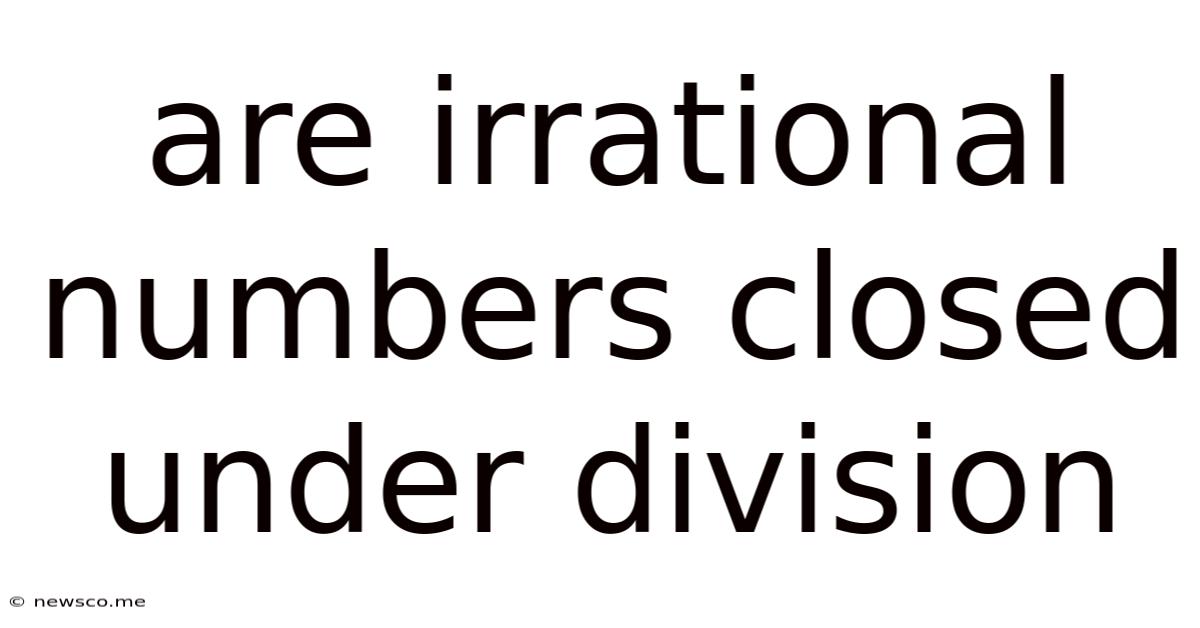Are Irrational Numbers Closed Under Division
News Co
May 08, 2025 · 4 min read

Table of Contents
Are Irrational Numbers Closed Under Division? Exploring the Intricacies of Irrational Numbers and Their Properties
The question of whether irrational numbers are closed under division is a fascinating exploration into the nature of these enigmatic numbers. While the answer might seem straightforward at first glance, a deeper dive reveals surprising complexities and nuanced considerations. This comprehensive article delves into the intricacies of irrational numbers, their properties, and the implications of division within this unique set. We'll examine various examples and counter-examples, ultimately providing a clear and well-reasoned answer.
Understanding Irrational Numbers
Before diving into the core question, let's establish a firm understanding of what constitutes an irrational number. Irrational numbers are real numbers that cannot be expressed as a simple fraction – a ratio – of two integers. In other words, they cannot be written in the form p/q, where p and q are integers, and q is not zero. This characteristic distinguishes them from rational numbers, which can be expressed as such fractions.
Key Characteristics of Irrational Numbers:
-
Non-repeating, Non-terminating Decimals: Irrational numbers, when expressed in decimal form, possess infinite digits that neither repeat in a pattern nor terminate. This is a defining feature, setting them apart from rational numbers which either terminate or have a repeating decimal expansion.
-
Examples: The most famous irrational number is π (pi), the ratio of a circle's circumference to its diameter. Other well-known examples include e (Euler's number), the square root of 2 (√2), and the golden ratio (φ).
-
Infinite and Uncountable: The set of irrational numbers is infinite and uncountable, meaning there are infinitely more irrational numbers than rational numbers. This concept is explored in Cantor's diagonal argument, a landmark achievement in set theory.
The Division Operation and its Implications
Division, a fundamental arithmetic operation, involves splitting a quantity into equal parts. When considering the closure property of a set under a given operation, we ask: If we perform the operation on any two elements within the set, does the result always remain within the set?
For example, integers are closed under addition because the sum of any two integers is always an integer. However, integers are not closed under division, as dividing two integers doesn't always yield an integer (e.g., 5/2 = 2.5).
Exploring the Division of Irrational Numbers: A Case-by-Case Analysis
The question of whether irrational numbers are closed under division hinges on the outcome of dividing one irrational number by another. Let's consider several scenarios:
Scenario 1: Division of two distinct irrational numbers.
Consider dividing √2 by √8. We have:
√2 / √8 = √(2/8) = √(1/4) = 1/2
In this case, the result is 1/2, which is a rational number. This demonstrates that the division of two irrational numbers does not always result in an irrational number. Therefore, irrational numbers are not closed under division.
Scenario 2: Division involving π.
Let's consider π divided by itself: π/π = 1. The result, 1, is a rational number (1/1). This further supports the conclusion that irrational numbers are not closed under division.
Scenario 3: Division resulting in an irrational number.
While the previous examples show that irrational numbers are not closed under division, it's crucial to note that the division of two irrational numbers can, in some cases, result in an irrational number. For instance, consider the division of 2√2 by √2:
2√2 / √2 = 2
Here, the result is 2, which is a rational number. However, scenarios exist where the result remains irrational. Consider the case where we divide an irrational number by 1: √2 / 1 = √2. The result is still irrational. However, this example alone doesn't prove closure because closure requires the property to hold true for all pairs of irrational numbers, which is not the case.
Scenario 4: The impact of algebraic properties.
It's important to consider the algebraic properties of irrational numbers. While some operations maintain irrationality (e.g., multiplying two irrational numbers can yield an irrational result), others, such as division, don't guarantee the preservation of irrationality. This fundamental difference is what dictates the closure property.
Counter-Examples and Proof of Non-Closure
The examples above clearly illustrate that the division of two irrational numbers can produce either a rational or an irrational number. The existence of even one instance where the division of two irrational numbers yields a rational number is sufficient to disprove the closure property.
Therefore, we can definitively state:
Irrational numbers are NOT closed under division.
Conclusion: The Importance of Closure Properties
The concept of closure is fundamental in abstract algebra and number theory. Understanding whether a set is closed under certain operations provides crucial insights into its structure and properties. The non-closure of irrational numbers under division highlights the richness and complexity inherent in the number system. While seemingly a simple question, the exploration reveals subtle distinctions within the realm of irrational numbers, reinforcing the importance of rigorous mathematical reasoning. The lack of closure emphasizes that we cannot simply assume that operations on irrational numbers will always yield irrational results. Careful consideration of each specific case is necessary. Further exploration into this topic can involve investigating specific subsets of irrational numbers or exploring alternative number systems where closure properties might differ.
Latest Posts
Related Post
Thank you for visiting our website which covers about Are Irrational Numbers Closed Under Division . We hope the information provided has been useful to you. Feel free to contact us if you have any questions or need further assistance. See you next time and don't miss to bookmark.